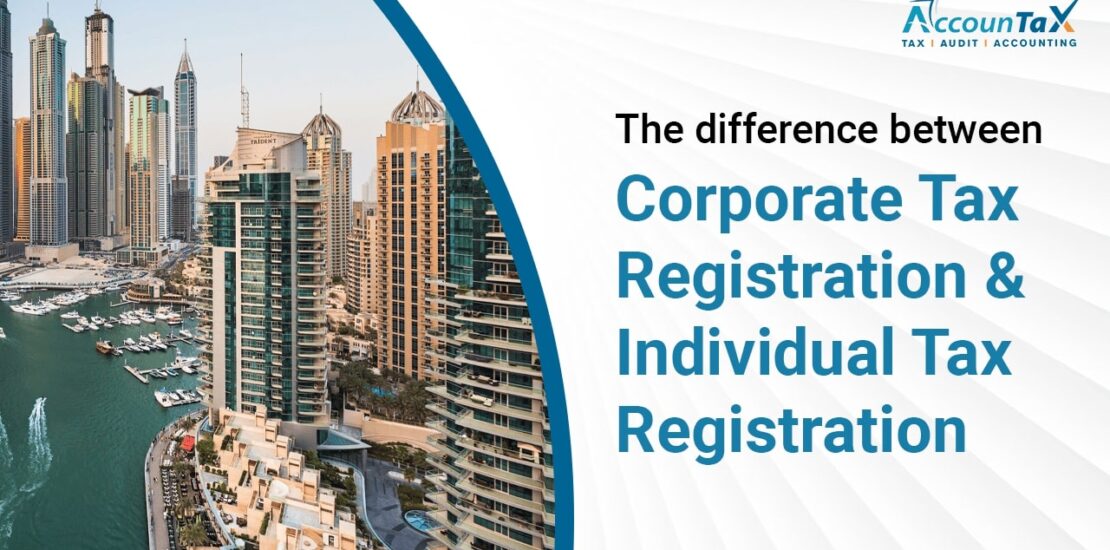Difference Between Corporate Tax Registration & Individual Tax Registration
- October 30, 2024
- Posted by: admin
- Category: Corporate Tax

If you’re a business owner and are confused about taxation, especially when it comes to corporate tax registration and individual tax registration, This blog is for you. Today, we’ll tell you the differences between UAE corporate tax registration and individual tax registration and which one might be more suitable for your business. So let’s get started.
Corporate tax registration
Corporate tax registration is a sort of registration that makes sure that your business aligns with the tax regulations in the UAE. In this process, companies register with the Federal Tax Authority (FTA) to get a Tax Identification number. Corporate tax registration is done so that companies avoid any government penalties and help the country’s economy.
Features of corporate tax registration in UAE
Now that you know about corporate tax registration. Let’s find out their features:
1. Applicability
There’s a specific profit threshold for companies that pay corporate tax in the UAE. If you’re lucky, you might not need to go through the entire tax registration process.
2. Tax rate
These tax rates are often set at competitive rates to ensure the country attracts foreign investors.
3. Exemptions
Certain free zone companies and government-owned entities may still benefit from tax exemptions under specific conditions.
4. Registration process
Businesses must register with the Federal Tax Authority (FTA) through an online portal. The corporate tax registration process involves submitting financial documents, tax returns, and business information.
How to apply for corporate tax registration in UAE
Applying for corporate tax registration in the UAE is very simple. All you have to do is follow these step-by-step corporate tax registration steps:
1. Gather documents
Ensure you have all necessary documents, including business licenses, audited financial statements, and legal registration papers.
2. Submit application
Register through the Federal Tax Authority’s online portal, fill in your details, and attach the required documentation.
3. Receive tax identification number (TIN)
After review, you will receive a Tax Identification Number, confirming your business is registered for tax purposes.
4. Annual reporting
Registered businesses must file annual tax returns and report profits to calculate their corporate tax liability. By complying with corporate tax registration, businesses can avoid penalties, maintain their reputation, and continue benefiting from the UAE’s favorable economic conditions.
Individual tax registration
While the UAE doesn’t impose personal income taxes, expatriates may need individual tax registration to prove residency and avoid double taxation. A tax residency certificate serves as proof of residency in the UAE.
Key features of individual tax residency in the UAE
Let’s move forward to the key features of individual tax residency in the UAE:
1. No personal income tax
Residents of the UAE are not required to pay personal income tax, making the country a popular destination for expatriates.
2. Tax residency certificate
To prove UAE residency and avoid taxation in another country, individuals must obtain a tax residency certificate.
3. Self-certification
Individuals need to fill out an individual tax residency self-certification form to provide proof of their eligibility for UAE tax residency status.
4. Required documents
To apply for a tax residency certificate, individuals typically need to provide copies of their passport, Emirates ID, proof of residency (like a lease agreement), and other supporting documentation.
How to apply for a tax residency certificate in UAE
For expatriates and residents of the UAE, obtaining a tax residency certificate is relatively simple. Here’s how:
1. Prepare documents
Gather passport copies, Emirates ID, visa, and proof of residency, such as utility bills or rental contracts.
2. Submit application
Apply through the Federal Tax Authority’s online system. Fill out the individual tax residency self-certification form as part of the process.
3. Receive a certificate
Upon approval, you will receive the tax residency certificate, which is valid for one year. This certificate can be used to claim tax benefits in your home country and avoid double taxation.
Key differences between corporate and individual tax registration
Now that we’ve outlined the processes, let’s break down the key differences between corporate tax registration and individual tax registration:
1. Purpose of registration
• Corporate Tax Registration: Required for businesses to report their profits and comply with tax laws. Companies pay taxes based on their net income.
• Individual Tax Registration: Required for individuals to prove tax residency, particularly for expatriates looking to avoid taxation in their home country.
2. Eligibility and applicability
• Corporate Tax: This applies to businesses above a specific profit threshold in the UAE. Some sectors, like oil and gas, are taxed at different rates.
• Individual Tax: Personal income is not taxed in the UAE, but individuals may need to prove tax residency status for foreign tax purposes.
3. Required documents
• Corporate Tax Registration: Businesses need to submit audited financials, business licenses, and other legal documentation.
• Individual Tax Registration: Individuals need proof of residency, passport copies, Emirates ID, and completed self-certification forms.
4. Benefits
1. Corporate Tax Registration: Ensures compliance with local laws and allows businesses to avoid penalties. Registered companies can also engage in government contracts.
2. Individual Tax Registration: Provides expatriates with the ability to avoid double taxation in their home country by proving they are UAE residents.
Conclusion
Knowing the differences between corporate and individual tax registration is crucial in the UAE. While corporate tax is new, individuals remain free from income tax but may need a tax residency certificate. Staying informed ensures successful navigation of the UAE’s tax environment.
